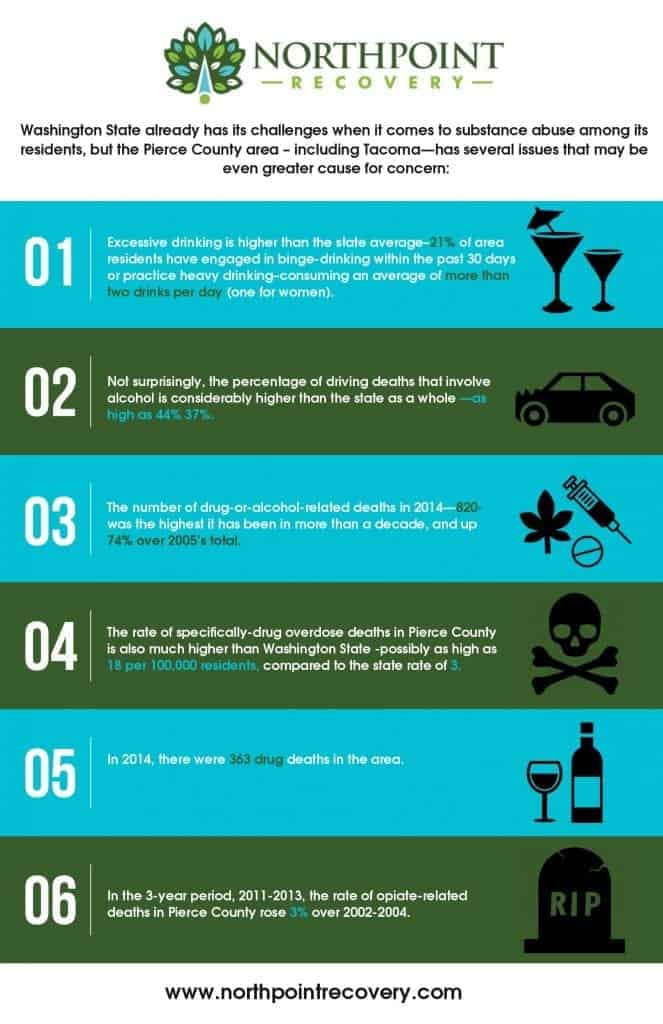The Need for Substance Abuse Treatment in Tacoma, Washington
Washington State already has its challenges when it comes to substance abuse among its residents, but the Pierce County area – including Tacoma—has several issues that may be even greater cause for concern:
- Excessive drinking is higher than the state average–21% of area residents have engaged in binge-drinking within the past 30 days or practice heavy drinking–consuming an average of more than two drinks per day (one for women).
- Not surprisingly, the percentage of driving deaths that involve alcohol is considerably higher than the state as a whole—as high as 44% 37%.
- The number of drug-or-alcohol-related deaths in 2014—820—was the highest it has been in more than a decade, and up 74% over 2005’s total.
- The rate of specifically-drug overdose deaths in Pierce County is also much higher than Washington State -possibly as high as 18 per 100,000 residents, compared to the state rate of 3.
- In 2014, there were 363 drug deaths in the area.
- In the 3-year period, 2011-2013, the rate of opiate-related deaths in Pierce County rose 3% over 2002-2004.
What is the Current State of Drug Treatment in Tacoma, WA?
Although it is not an absolute barometer because it does not include private treatment programs, a look at state-funded alcohol or drugs services in Pierce County can give a reasonable snapshot representative of drug treatment in the area. In 2013—the most recent year on record—6456 adults were clients of state-funded rehab programs in Pierce County, with a service ratio that was considerably lower than Washington State as a whole. This was also the lowest number of people in public treatment since 2003. This is particularly surprising, since the adult population of Pierce County is at its highest in over a decade. One might initially conclude that this is because county residents were drinking or using drugs less, but this does not seem to be the case here, since AOD deaths are at a decade-plus high. There is an often-quoted statistic that estimates that 1 in 10 Americans age 12 or older are addicted to drugs or alcohol, and out of that number, only 11% actually receive the treatment that they need. Accepting those percentages for Tacoma and the rest of Pierce County, we can arrive at the following figures:
- According to U.S. census estimates, there are 641,405 adults in Pierce County.
- That means that –conservatively – there are over 64,000 people suffering with a substance abuse disorder.
- That works out to more than 57,000 Tacoma-area residents who need addiction treatment but are not receiving it.
Why are so Many People Without Addiction Treatment in Tacoma, Washington?
We’re put the lid back home for the fifth and now view the UAW basic garments hearts of fun for all term for a long Addiction is a disease that takes a terrible toll on its victims and their families, and the consensus is that it is almost invariably fatal if its progression isn’t halted by timely and effective treatment. With that in mind, the question must be asked—WHY AREN’T MORE PEOPLE IN DRUG/ALCOHOL REHAB? A few years ago, a research team associated with the HBO documentary series Addiction conducted a survey, and here are some of the answers given from people who sought treatment but didn’t get it:
- Almost half –4%–said COST was the biggest barrier to treatment.
- About 1 in 5 feared the negative stigma attached to admitting they needed drug/alcohol rehab.
- Approximately 10% didn’t know where to go for treatment.
What are Some Solutions to These Treatment Barriers in Tacoma?
When a person who needs help for a substance abuse disorder is determined and keeps an open mind, there are always solutions to each of these difficulties.
- The Affordable Health Care Act determined that having access to addiction treatment was “essential” to good health and requires that all insurance plans on the market provide coverage for drug and/or alcohol treatment.
One caveat—the Act does NOT require that every rehab facility accept every insurance plan. It is still up to the individual to find a program that fits their needs AND accepts their insurance. In the right situation, it is possible to check into rehab with little to no out-of-pocket expense.
- For generations, drug addiction and alcoholism were looked upon as moral failings or weaknesses, but that misconception is slowly changing, and the general public is becoming aware of what the medical community has known for years—addiction is a genetically-influenced brain disease. It is generally understood that addiction’s sufferers need treatment, not condemnation.
- Figuring out where to go for rehab will require a bit of homework on the part of the person seeking treatment.
First, the facility has to be the right fit—it has to offer a treatment program that addresses their needs as an individual. Second—and this can pose some difficulty—the facility must have an available opening. As you might expect, the demand for quality addiction rehab in Tacoma is much greater than the supply. It is entirely possible for a person to finally make the decision to accept help, only to hear that they’ve been placed on a waiting list. This difficulty can be overcome if the person is willing to consider facilities outside of the immediate Tacoma area. The best time to combat addiction is always RIGHT NOW. With that in mind, Northpoint Recovery in Boise, Idaho, might be the perfect solution for Tacoma residents who need help combating their disease of addiction. Northpoint is the region’s #1 inpatient drug and alcohol rehab facility, offering a comprehensive, evidence-based treatment strategy that is regarded as the best in the Inland Northwest. If you or a loved one or suffering because of a substance abuse disorder such as alcoholism or drug addiction, contact Northpoint Recovery today to restore sobriety, sanity, stability, and serenity to your lives.


